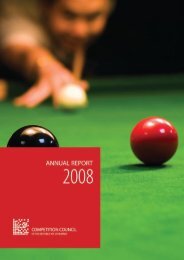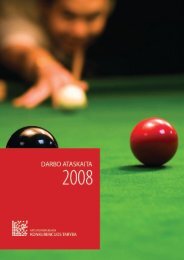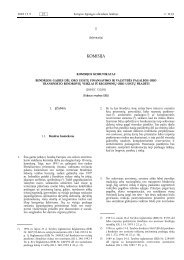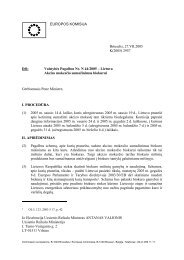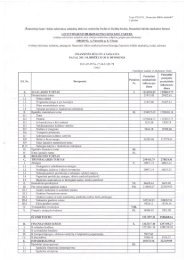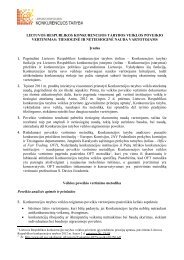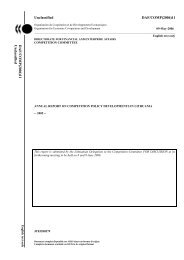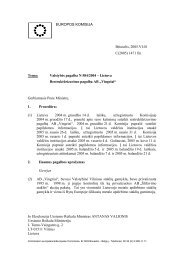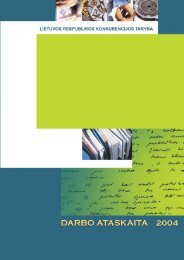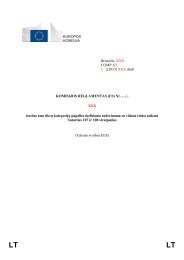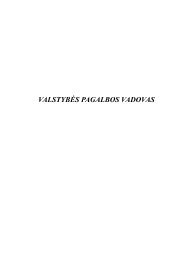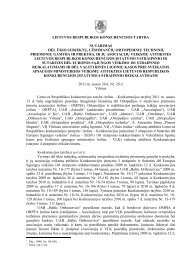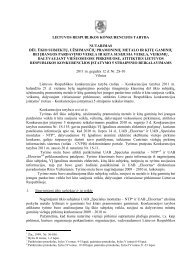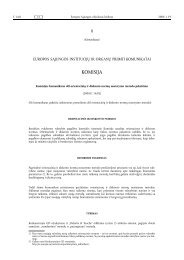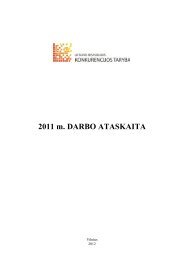Annual Report 2006
Annual Report 2006
Annual Report 2006
You also want an ePaper? Increase the reach of your titles
YUMPU automatically turns print PDFs into web optimized ePapers that Google loves.
LAW<br />
ENFORCEMENT<br />
AND<br />
SUPERVISION<br />
NATURAL GAS:<br />
LIBERALISATION PROSPECTS<br />
For several years already the Law on Natural<br />
Gas has been an object of heated public<br />
discussions basically due to its provisions<br />
containing the market liberalisation<br />
proposals. Among legislators there has been<br />
some indecisiveness regarding the adoption<br />
of the Law due to the disagreement as to<br />
the expediency of gas price regulation for<br />
consumers. In December <strong>2006</strong>, the problem<br />
attracted the attention of the Commission.<br />
The gas market opening is supposed to be<br />
beneficial to consumers enabling them to<br />
choose, from a number of suppliers the one<br />
offering more affordable prices at beneficial<br />
terms. Lithuania, however, being forced<br />
to purchase the total gas supplies from a<br />
sole supplier, the monopolist Gasprom is<br />
virtually deprived of any right of choice.<br />
Therefore, the market has been facing<br />
difficulties in developing competition,<br />
which could result in lower gas prices; this is<br />
clearly reflected in investigations conducted<br />
by the CC. The investigation in relation to<br />
a possible abuse of a dominant position<br />
by AB Lietuvos dujos in the natural gas<br />
market when concluding agreements with<br />
free gas consumers is expected to facilitate<br />
a thorough assessment of the situation<br />
in the market and help find responses to<br />
questions related to the peculiarities of the<br />
operation of this market. In the course of<br />
the investigation the suppliers‘ pricing in<br />
respect of the consumers, the profitability<br />
of natural gas supply and possible<br />
developments of final price for consumers<br />
will be also assessed.<br />
OIL EXTRACTION AND PRODUCTS<br />
Lithuanian oil extraction market has<br />
changed during the year <strong>2006</strong> following<br />
the merge of the two major operators<br />
in the market. The CC authorised the<br />
implementation of the concentration by AB<br />
Geonafta by acquiring up to 100 % of shares<br />
of UAB Genčių nafta in accordance with the<br />
submitted notification.<br />
UAB Lietuva Statoil trading in oil<br />
products was authorised to implement<br />
the concentration in accordance with the<br />
submitted notification by acquiring part of<br />
the assets of UAB Okseta – the oil product<br />
terminal.<br />
5.<br />
Market overview<br />
RAW TIMBER SUPPLY MARKET<br />
The CC under the assignment given by<br />
the Prime Minister and the Committee on<br />
Economics of the Seimas of the RL initiated<br />
an investigation in the market of raw timber<br />
intended for the heat supply enterprises. The<br />
purpose of the investigation was to examine<br />
a probable price cartel agreement between<br />
the raw timber suppliers. The analysis of the<br />
data obtained from 42 forestry enterprises<br />
showed that in terms of heat generation<br />
capacity the retail and wholesale prices of<br />
firewood were different within the same<br />
relevant market.<br />
Having performed the raw timber supply<br />
market investigation and analysed the<br />
prices of raw timber intended for the heat<br />
suppliers, the CC established that in view<br />
of the price differences and the fluctuation<br />
trends in the market concerned the<br />
agreement is hardly presumptive. Based on<br />
the conclusion the CC decided to further<br />
analyse and supervise the actions of the<br />
undertakings operating therein.<br />
PAYMENT CARD MARKET:<br />
COMPETITION IS STRENGTHENING<br />
In <strong>2006</strong> based on the experience of<br />
the Commission and other European<br />
competition authorities the CC carried out<br />
a survey in the bank payment card market<br />
of Lithuania. The object of this market<br />
investigation was the so-called POS (pointof-sale)<br />
system that covers the consumer<br />
settlement using the payment cards and the<br />
relations arising between the banks and the<br />
sellers, between the banks, also between the<br />
banks and the cardholders. The objective<br />
of the survey was to find out how and what<br />
kind of services provided different entities<br />
operating in the payment card market. The<br />
findings of the survey established that banks<br />
on the said market do not exercise market<br />
power, and competition between banks is<br />
strengthening.<br />
The survey of the consumer mobility in<br />
the retail banking services showed that<br />
Lithuanian consumers are sufficiently<br />
conscious in selecting the service provider<br />
and that there are no major obstacles to<br />
shift the bank.<br />
The legal regulation of the operations of the<br />
Lithuanian banks has been brought into<br />
line with the relevant provisions of the EU<br />
law and developed taking into account the<br />
experience accumulated in other countries.<br />
As a result, the entry into market by the<br />
banks is restricted only by the requirements<br />
necessary to ensure the financial viability,<br />
reliability and stability of the new market<br />
player and its future customers. No specific<br />
restrictions are provided for the entry<br />
into the market by subdivisions of foreign<br />
banks.<br />
This survey helped to understand the<br />
behaviour of the consumers using of retail<br />
banking services and the factors affecting<br />
their choice of services provider.<br />
TRADING NETWORKS:<br />
STATUS AND CHALLENGES<br />
Vytautas Gliebus<br />
Head of the Consumer Goods Division<br />
Under the mandate of Resolution<br />
No. 17-4961 of 7 July 2003 of the<br />
Government of the Republic of<br />
Lithuania obligating the CC to<br />
periodically estimate the share in<br />
the market held by major trading<br />
networks in order to be able, where<br />
necessary, take appropriate actions<br />
and measures, the CC analysed the<br />
data and other materials related to<br />
retail trade in food products. The<br />
analysis showed that the major trading<br />
networks held 6.5 % shops trading in<br />
food products; the area of the network<br />
shops exceeded 47 % of total area of<br />
such shops, and the turnover of goods<br />
generated per 1 sq. m is at times twice<br />
or even higher than the one of the<br />
shops not part of the network. The<br />
network-managed shops and trading<br />
centres are operating throughout the<br />
entire territory of Lithuania, only five<br />
municipalities are an exception with<br />
not a single shop belonging to the<br />
network, and five municipalities have<br />
one shop of the kind each. The largest<br />
number of trading networks shops<br />
operates in major cities – Vilnius,<br />
Kaunas and Klaipėda. The analysis<br />
assessed the retail trading differences<br />
between specialised stand-alone stores<br />
(of mixed goods), also belonging to<br />
individual minor networks, unions or<br />
systems and major trading networks.<br />
The network stores are distinguished<br />
by their ability to offer a large<br />
assortment of goods (30,000-40,000<br />
items) that makes the network stores<br />
one-stop shops with long opening<br />
hours, a standard of services, range<br />
of ancillary services, etc., that the<br />
specialised stores and stores of mixed<br />
goods cannot offer to their customers.<br />
Seeking to establish whether or not the<br />
major trading networks are using their<br />
advantage in bargaining of supplies the<br />
CC interviewed Lithuanian producers<br />
operating in nine fields of activities.<br />
The findings not revealed a single case<br />
of producers cooperating exclusively<br />
with a single major trading network<br />
– all producers maintain business<br />
relations with nearly all networks<br />
to whom they sell from 6 to 85 % of<br />
their products; furthermore, producers<br />
favourably assess the export possibilities<br />
specifically expanded following the EU<br />
accession making the producers not<br />
dependant on a single sale channel.<br />
Producers did not provide any specific<br />
facts of any pressure from the part of<br />
the trading networks. The final data<br />
of the investigation performed will be<br />
summarised in the course of 2007.<br />
6.<br />
Legislation and promotion<br />
of competition culture<br />
During <strong>2006</strong>, the CC actively participated in<br />
the legislative processes. The CC prepared a<br />
draft law on the Amendment of the LC, 16<br />
draft laws and 60 other draft legal acts were<br />
examined and assessed from the point of<br />
view of competition.<br />
THE DRAFT LAW ON AMENDMENTS OF<br />
THE LC<br />
Late in <strong>2006</strong>, the CC drafted the Law on<br />
Amendments of the LC and submitted it<br />
for consideration to a number of relevant<br />
ministries. The draft law contained the<br />
following major changes and novelties:<br />
- having regard to the provisions of Council<br />
Regulation (EC) No. 1/2003 and the powers<br />
vested to the Commission the draft law<br />
proposes to empower the CC officials to<br />
seal any business premises and books and<br />
records for the period and to the extent<br />
necessary for the inspection, and subject to<br />
the court warrant conduct inspections not<br />
only in the business premises used by the<br />
undertaking but also in the private homes<br />
of the employees of the undertaking. The<br />
draft law also includes a proposal to extend<br />
the scope of sanctions at the disposal of<br />
the CC, while authorising the CC to apply<br />
structural measures upon undertakings<br />
for prohibited agreement and abuse of a<br />
dominant position (obligations to sell an<br />
undertaking or part thereof; assets of an<br />
undertaking or part thereof, shares or part<br />
thereof, to reorganise an undertaking);<br />
- having considered the Ruling of 28 July<br />
<strong>2006</strong> of the Supreme Administrative Court<br />
of Lithuania establishing that the right<br />
of the CC to pass confidential decision<br />
may be only provided in the law, the draft<br />
law proposed to introduce the provisions<br />
authorising the CC not to publish its<br />
resolutions in cases where the publication<br />
of the resolution may prejudice the course<br />
of the investigation conducted by the CC. In<br />
such case the resolution of the CC could be<br />
deemed confidential until the threat to the<br />
course of the investigation expires.<br />
COMMENTS TO DRAFT LAWS<br />
Conclusions in respect to the Draft Law on<br />
the Amendment of Article 9 of the Law on<br />
Immovable Property Tax were submitted<br />
to the Board of the Seimas of the Republic<br />
of Lithuania. The draft law proposed to<br />
supplement Article 9(2) of the Law on<br />
Immovable Property Tax with a new item<br />
2 wherein the immovable property used as<br />
hotels is excluded from other immovable<br />
property for commercial use, establishing<br />
that the immovable property used for<br />
hotels is valued on the basis of the valuein-use<br />
method applying mass valuation of<br />
the immovable property (such law being<br />
enacted, owners of hotels could enjoy a lower<br />
immovable property tax). In the opinion of<br />
the CC, in the absence of a clear and uniform<br />
definition of the immovable property used<br />
for hotels difficulties may arise in separating<br />
the hotel activities (accommodation<br />
services) from other activities that the same<br />
entity may be engaged in the same premises<br />
(for example, the catering services) and<br />
addressing the issue of evaluation of such<br />
immovable property (that is also used for<br />
other than accommodation purposes).<br />
Such uncertainty in respect of the concept<br />
of the immovable property used for hotel<br />
purposes could have a consequence of<br />
different competition conditions for<br />
undertakings operating in the relevant<br />
market (for example, the value of the<br />
immovable property used by restaurants<br />
operating in hotels would be established<br />
according to the value-in-use method, while<br />
a comparative value method could be used<br />
in case of valuation of other immovable<br />
property used for the provision of catering<br />
services).<br />
16 ANNUAL REPORT <strong>2006</strong> ANNUAL REPORT <strong>2006</strong> 17<br />
* * *<br />
The CC submitted its comments concerning<br />
the draft Law amending Chapter 4 of<br />
the Appendix to the Law on the Basics of<br />
National Security. The provision of Part 2 of<br />
Section 2 of Chapter 4 “Economic policy”<br />
of the Appendix to the Law on the Basics of<br />
National Security reads: “A single investor<br />
shall be prohibited from dominating in one<br />
or several economic sectors of strategic<br />
importance to national security”. In the<br />
opinion of the CC such provision of the law<br />
is not sufficiently clear (it is not clear how<br />
to define dominance in an economic sector<br />
rather than a relevant market), and hardly<br />
enforceable in practice as no measures<br />
have been provided for to be taken in<br />
the event an undertaking, e.g., due to its<br />
successful commercial activity infringes<br />
this prohibition, becomes dominant (the<br />
LC does not prohibit holding of a dominant<br />
position, it only prohibits its abuse).



